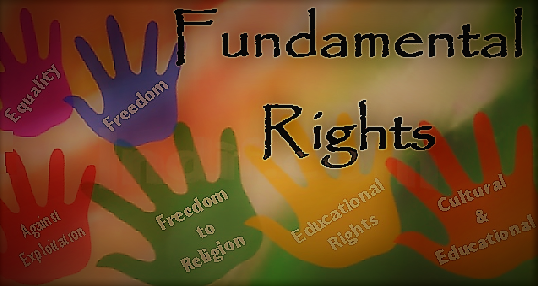THE MAGNA CARTA OF INDIA-PART A
Part III of the Indian Constitution is enshrined by the Fundamental Rights. These rights promote political democracy and protect it from infringement by the government. Articles 12-35 are known as Fundamental Rights they are sacrosanct. These rights are superior to ordinary laws. As we all know that the major part of our Constitution is being taken from the Government Of India Act 1935 also called as the blueprint of the Indian constitution but there is one difference the Fundamental Rights is present in the former. Our constitution framers adopted it from the American Constitution where it is called as the American Bill Of Rights. The difference between the American Bill Rights and the Fundamental Rights that in the former only judiciary envokes the limitations whereas in the latter legislature. The Fundamental Rights of Indian constitution are most extensive than any other constitution in the world. The rights in Part III cannot be altered but Amended. These special rights are directly enforced by the Supreme Court of India. Though being one of the pillars of our constitution the Fundamental Rights are negative in nature. It means that all Fundamental Rights are guaranteed against the State.
CLASSIFICATION OF THE FUNDAMENTAL RIGHTS.
Initially the Constitution of India had 7 Fundamental Rights. After the 44th Amendment Act of 1978, Article 31 i.e Right To Property was annulled and was placed under separate Article 300 A in the constitution as a Legal Right. Now we have only 6 Fundamental Rights.
- ARTICLES 14-18: RIGHT TO EQUALITY.
- ARTICLES 19-22: RIGHT TO FREEDOM.
- ARTICLES 23-24: RIGHT AGAINST EXPLOITATION.
- ARTICLES 25-28: RIGHT TO FREEDOM OF RELIGION.
- ARTICLES 29-30: CULTURAL AND EDUCATIONAL RIGHTS.
- ARTICLES 32: CONSTITUTIONAL REMEDIES.
There are certain Fundamental Rights that are available only to the citizens of India. These Articles are- 15,16,19 and 30. The rights which are available to both the citizens as well as foreigners are Articles-14,20,21,23,25,27 and 28. The Fundamental Rights with positive obligations are Articles-25, 29(1) and 30(1) and with negative obligations are Articles-14,15(1),16(2),18(1),20, 22(1) and 28(1). Rights that impart absolute limitations on the Legislature are Articles-15,17,18,20, and 24. Article 21 i.e Protection Of Life And Personal Liberty, are against the executive, not the legislature.






